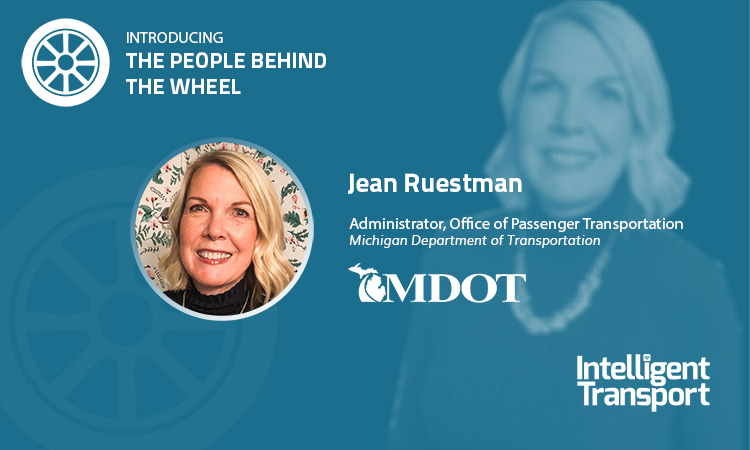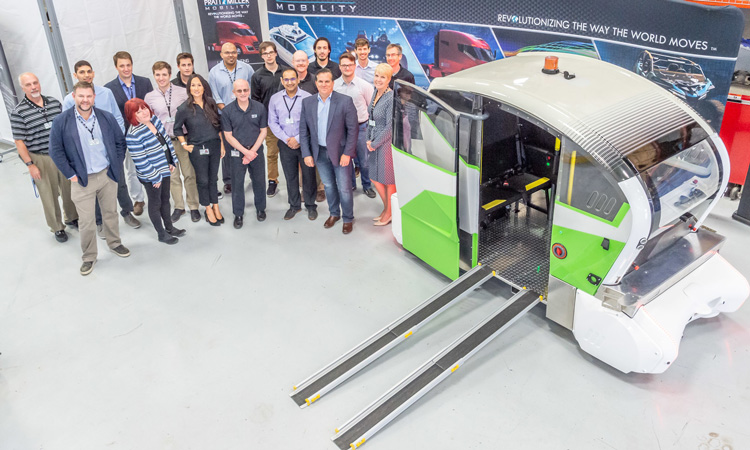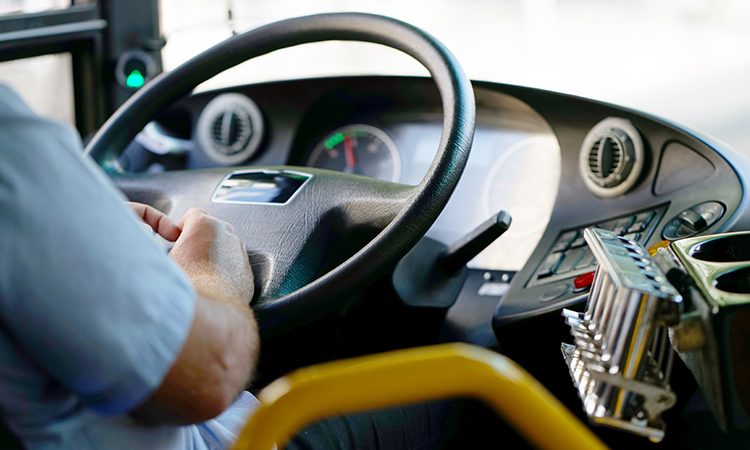The people behind the wheel: Jean Ruestman’s story, Michigan Department of Transportation
- Like
- Digg
- Del
- Tumblr
- VKontakte
- Buffer
- Love This
- Odnoklassniki
- Meneame
- Blogger
- Amazon
- Yahoo Mail
- Gmail
- AOL
- Newsvine
- HackerNews
- Evernote
- MySpace
- Mail.ru
- Viadeo
- Line
- Comments
- Yummly
- SMS
- Viber
- Telegram
- Subscribe
- Skype
- Facebook Messenger
- Kakao
- LiveJournal
- Yammer
- Edgar
- Fintel
- Mix
- Instapaper
- Copy Link
Posted: 30 November 2023 | Jean Ruestman - Michigan Department of Transport | No comments yet
For the latest instalment of Intelligent Transport’s exclusive ‘The people behind the wheel’ series, Jean Ruestman, Administrator of the Office of Passenger Transportation at the Michigan Department of Transportation, shares insights into her transformative 33-year career, emphasising her role in fostering innovation, adapting to challenges like the COVID-19 pandemic and envisioning a dynamic and inclusive future for public transport.


Can you tell us about your role at the Michigan Department of Transportation (MDOT)?
I’m the Administrator of the Office of Passenger Transportation (OPT). As a member of the Director’s Management Team, I have the overall responsibility for the Office of Passenger Transportation’s state-wide programmes and applicable safety and regulatory functions. This includes the department’s relationship with the transit industry, state-wide intercity bus programmes, bus regulatory programme, marine passenger services and local public bus transportation services.
My vision for OPT is to help Michigan’s transit industry embrace innovation and new technologies to improve mobility for all”
I’ve been in this role for a little over five years, but I’ve worked in this office for my entire 33-year career with MDOT. I started as a project manager, working directly with the local public transit agencies – overseeing their contracts and providing technical assistance. I then became a supervisor, overseeing both project managers and our federal programme managers, and then became the manager of our Program Administration Section, which had responsibility for financial management, intercity bus and the state law, which prescribes vehicle safety for private passenger-for-hire vehicles.
All of those roles have provided me with a comprehensive understanding of the passenger transportation industries within our state. My involvement with national organisations – like the Transportation Research Board (TRB) – helped me develop a more global view and is what really sparked my interest in mobility innovation and new technology. My vision for OPT is to help Michigan’s transit industry embrace innovation and new technologies to improve mobility for all.
We have taken on the role of ‘risk taker’ by funding innovative projects that the transit agencies can’t afford to risk their local funds to pursue. We’ve now created two new positions specifically focused on mobility innovation to support the industry, and we’ve created a rural transit technology strategic plan. OPT has also become known for issuing mobility challenges to encourage the formation of public-private partnerships to solve mobility gaps using new technologies and innovation, along with the public transit expertise that our local public transit agencies possess.
What inspired you to seek a career in the transport industry?
Public transit benefits all of us and improves our world in so many ways. Transit gets people to jobs, school, healthcare and social gatherings… What a blessing to be a part of that”
In all honesty, I was simply looking for a good job when I applied to MDOT… I had never even ridden a public transit bus before! I truly believe it was fate. My first role as a project manager put me on the front line with the transit systems across the state – I spent at least half of my time out in the field visiting transit agencies, providing technical assistance regarding the state’s rules and regulations. But, more importantly, I was learning from them and witnessing just how important they are to the people in their communities. I interacted with the drivers, dispatchers, mechanics, planners, accountants and managers, and was so impressed by their amazing skills and their dedication to their customers. They were passionate about what they were doing and about improving the lives of those in their communities. It was inspiring. After about six months on the job, I knew that I had found a home in this industry.
Public transit benefits all of us and improves our world in so many ways. Transit gets people to jobs, school, healthcare and social gatherings. It helps to reduce congestion on our roadways, improves our environment and improves the economy. What a blessing to be a part of that! It is still so rewarding to me to have a career that allows me to play even a small role in an industry that has such a significant impact on all of our lives.


Credit: Michigan Department of Transportation
Have you experienced any challenges in your role and, if yes, how have you overcome them?
Being open to new ideas and new ways of completing ‘old tasks’ really paid off. It was a good lesson in the value of creativity and the willingness to take risks”
There have definitely been some challenges! Of course, the COVID-19 pandemic created many challenges for all workplaces. I was fortunate that my staff and I had come up with a plan for our office to begin allowing a small amount of remote work (one day a week) before the pandemic started. We already had the right technology for everyone, and we had agreed on how we would interact and complete tasks remotely. Being open to new ideas and new ways of completing ‘old tasks’ really paid off. It was a good lesson in the value of creativity and the willingness to take risks.
The other related challenge was how to help the transit agencies navigate unprecedented times and find a way to provide essential services safely. Communication with the transit agencies was key during those times. I set up nightly group calls to hear what their struggles were, and we brainstormed solutions and shared as much information as we could. I also made sure that we maintained a steady stream of funding and were as flexible as possible.
Another challenge that I think a lot of people in this industry face is convincing others, especially legislators, that public transit is a human service – not a profit-making endeavour. Metrics should be centred around people’s ability to access mobility options that enables them to lead healthy, productive lives without spending most of their pay checks on transportation. The only way to overcome this is through education about the impact and true cost of providing a comprehensive mobility ecosystem. I make sure that I present that information to our local, state and federal legislators and policy makers every chance that I get – and that the general public understands this, as well. It’s not something that you’re born knowing, you must be taught – and those of us in the industry must do the teaching.
What would be the top three highlights of your career in the industry to date?
The third highlight would be having people I admire refer to me as a “thought leader”. I was kind of blown away the first time someone called me that”
That’s difficult… There have been a lot of exciting experiences in the last 33 years! Number one would definitely be my promotion into this role. It’s an honour to be able to take all that I’ve learned and impact how the state programme is administered, and also to set a course for the future of public transit in Michigan. I’m trying to build a strong foundation of customer service, advanced technology and meaningful partnerships that I think will help to improve the equity and access to public transit in Michigan and maybe even stand as a model for others outside of our state.
The second highlight would be the opportunities that I’ve had to speak to people from all over the world – both as a presenter at national and international events, and as a committee member on teams like the Automated Bus Consortium and the TRB Standing Committee on Innovative Public Transportation Services and Technologies. There are so many brilliant people in this industry, and I feel very fortunate to be able to interact and learn from so many of them.
I guess I would have to say the third highlight would be having people I admire refer to me as a ‘thought leader’. I was kind of blown away the first time someone called me that – it was a person I had looked up to for a very long time and I was surprised to know that he saw me that way. It took me a while to believe that I was worthy of the title, and it still shocks me a little when I hear someone refer to me that way. I feel both honoured and humbled.


What key pieces of advice would you give to someone who is interested in a career in transport?
Don’t be afraid to reach out to people you see doing work that interests you – people in this industry are generally in it because they like to help people, and they will be happy to help you”
Immerse yourself in it. Ride every mode. Talk to passengers and operators. Get involved in the industry through some of the numerous organisations and associations that are focused on the topic. Most importantly, develop a passion and don’t be afraid to speak up and take on challenges. There are so many ways to be involved in this industry at the local, state, national and international level. Through those efforts, you can identify roles or jobs that appeal to you – maybe it’s research, or advocacy, or technology, or serving on a board, or driving a bus, or working for your state department of transportation. You can be involved on so many different levels.
Don’t be afraid to reach out to people you see doing work that interests you – people in this industry are generally in it because they like to help people, and they will be happy to help you pursue a career in the industry. Although I happened to join this career path by chance, I was very intentional in my efforts to immerse myself in it and learn as much as possible. That has made all the difference and opened many doors for new experiences and opportunities.
In an ideal world, what do you hope the future of public transport will look like?
This industry has evolved so rapidly in the last 10 years and is meeting the needs of so many more people than ever before – I hope that evolution continues well into the future”
My hope for the future is that public transport looks like a dynamic set of mobility options that meets the diverse needs of all citizens. I hope it is purposefully and thoughtfully built into the core amenities of every community. It is an essential aspect of a thriving community – just like grocery stores, medical facilities, parks and roads – and it should be planned for and funded accordingly. I hope, in the future, that people can take for granted that they can get where they need and want to go without owning a car.
I hope that we continue to utilise technology and innovation to improve access to public transport for all people. It is important to ensure that technological advances don’t lead to inequities – different needs, abilities and circumstances require different solutions. For some, that means the ability to plan, book and pay for their trip using a cell phone or smartwatch, but, for others, that means being able to speak to a trip planner and pay with cash. I hope that automation is implemented in a way that improves mobility for all without increasing congestion. And I hope that public transport continues to help us to reduce our carbon footprint on this planet. This industry has evolved so rapidly in the last 10 years and is meeting the needs of so many more people than ever before – I hope that that evolution continues well into the future.


Related topics
Public Transport, Staff & Skills Development, The People Behind the Wheel Series, Workforce Inclusivity
Related modes
Bus & Coach
Related cities
Michigan
Related countries
United States
Related organisations
Michigan Department of Transportation (MDOT)
Related people
Jean Ruestman







